Key takeaways:
- Perfume longevity is influenced by factors such as fragrance concentration, skin chemistry, and environmental conditions.
- Testing longevity involves applying scents and observing their evolution over time, noting personal reactions and impressions.
- When selecting long-lasting perfumes, consider the concentration of fragrance oils and the significance of base notes, as they affect how long a scent lasts.
- Personal testing on skin is essential, as the same fragrance can behave differently depending on individual body chemistry.
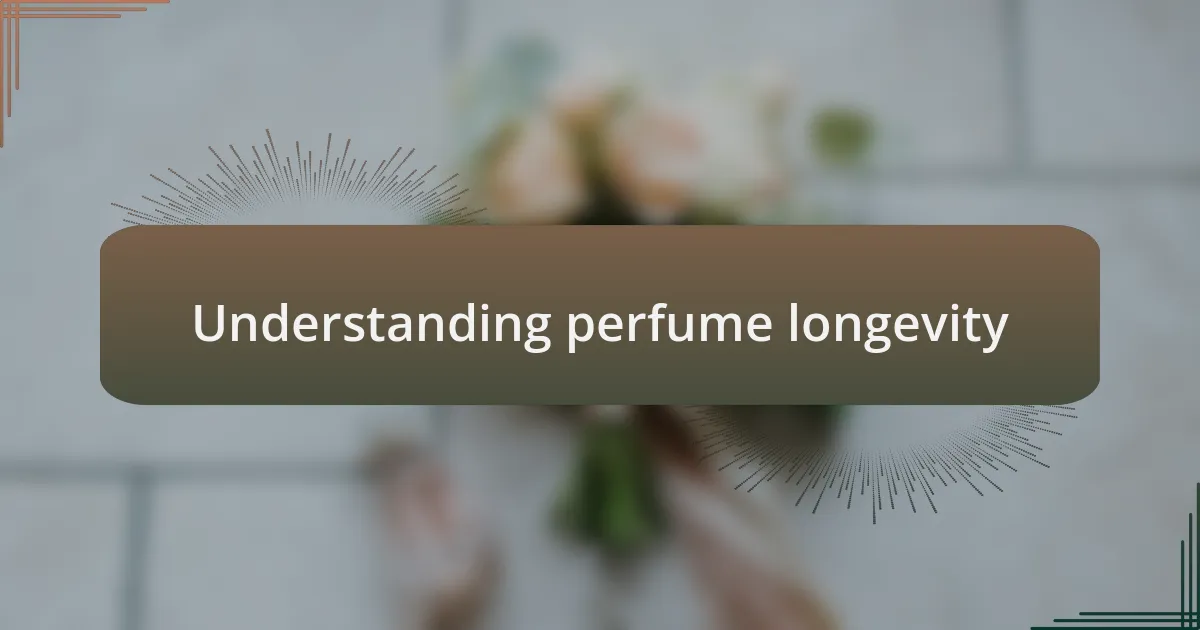
Understanding perfume longevity
Perfume longevity refers to how long a fragrance lasts on the skin after application. From my experience, I’ve found that factors like the fragrance’s concentration and the layering of scents significantly impact longevity. It’s fascinating to consider how a luxurious parfum can last an entire day, while an eau de toilette may fade within a few hours.
When I first began my journey into the world of perfumes, I noticed that certain scents would linger not just on my skin but even on my clothes. This lingering quality often evokes nostalgia and memories, making me appreciate how deeply intertwined fragrance and emotion can be. Have you ever caught a whiff of a scent that transported you back to a special moment? That’s the beauty of longevity!
I also believe that skin chemistry plays a vital role in how perfumes perform over time. I have friends who swear that a scent that barely lasts on me becomes their signature fragrance, lasting for hours. It’s intriguing to think about how our bodies interact with these complex blends, making each experience uniquely personal.
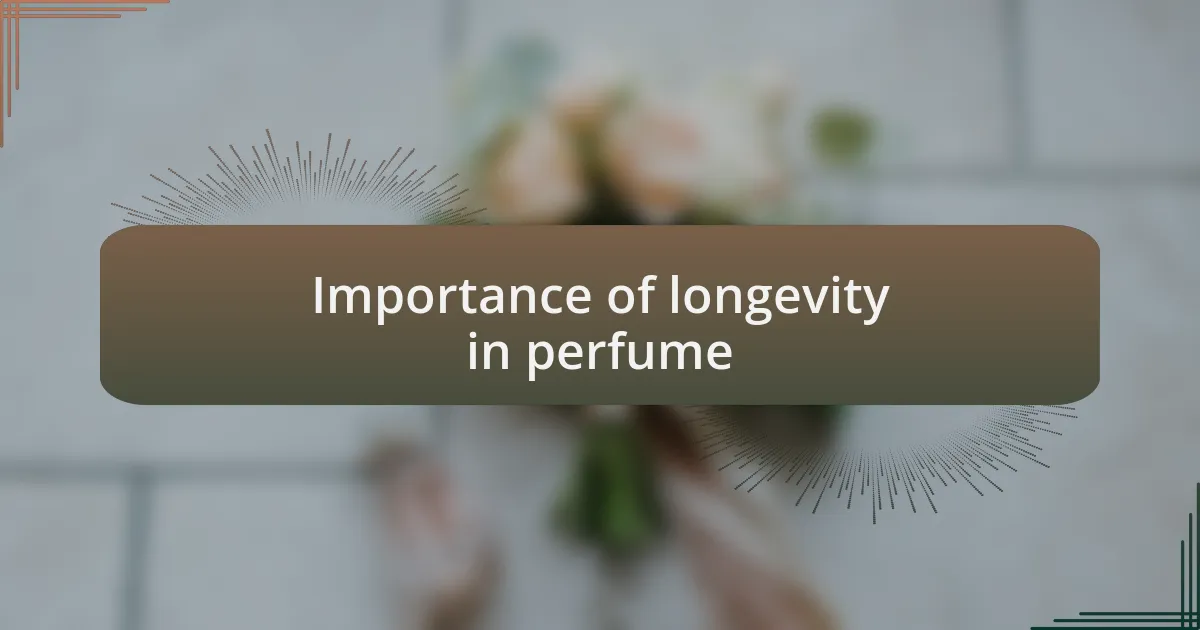
Importance of longevity in perfume
Longevity in perfume is vital, as it dictates how we experience a fragrance throughout the day. I often recall a particular evening where I wore a floral scent that remained vibrant during a dinner party, sparking compliments and conversations long after the initial spritz. Isn’t it incredible when a fragrance not only enhances your presence but also resonates with those around you, creating lasting impressions?
In my own fragrance journey, I’ve discovered that the allure of a scent lies not just in its initial appeal, but in how it evolves over hours. One memorable instance was when I wore a deep woody aroma to a weekend getaway. As the day unfolded, its rich base notes became more pronounced, perfectly mirroring the warm, cozy atmosphere of the cabin we rented. Have you ever noticed how a scent can transform along with your mood, deepening the connection you have with it?
The importance of longevity also extends to our personal routines and choices. For example, I find that when I choose a fragrance for a busy day or a special event, I lean towards those that promise endurance. It’s about reassurance; knowing that my fragrance will carry me through my activities adds to my confidence. Don’t you think that a long-lasting perfume elevates our experiences, allowing us to focus on what truly matters?
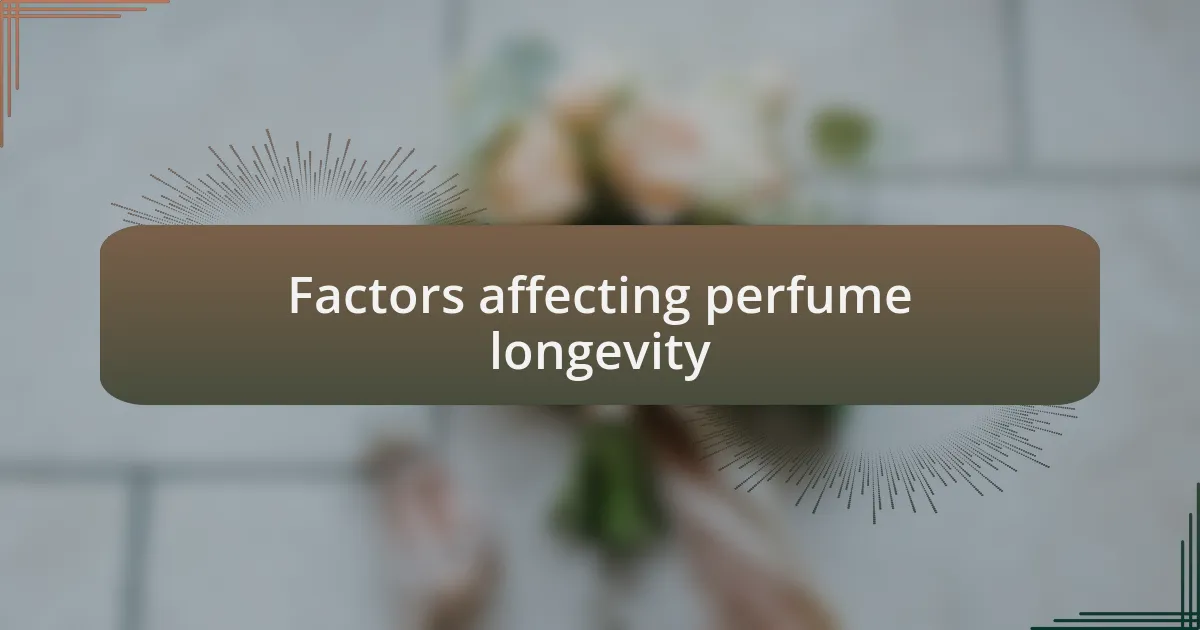
Factors affecting perfume longevity
When evaluating perfume longevity, the concentration of fragrance oils plays a crucial role. Personally, I’ve noticed that eau de parfums tend to last significantly longer than eau de toilettes, which often leave me reapplying throughout the day. Have you ever found yourself loving a scent but wishing it lasted just a bit longer? This concentration difference explains why some scents feel fleeting.
Another factor I consider is the skin type. For instance, my skin tends to absorb fragrances quickly, making it essential to test scents on different skin before committing. I remember trying a fresh citrus fragrance during summer, only to realize it faded within hours due to my skin’s chemistry. Isn’t it interesting how our unique body chemistry can alter a scent’s staying power?
Environmental conditions also impact how long a fragrance lingers. I’ve realized that wearing a perfume on humid days can enhance its performance, as the warmth helps to amplify and extend the scent. Conversely, in colder weather, I might find that certain perfumes just don’t project the way they do in summer. Have you experienced how temperature affects your favorite fragrances? It’s fascinating how a simple change in the atmosphere can completely shift our fragrance experience.
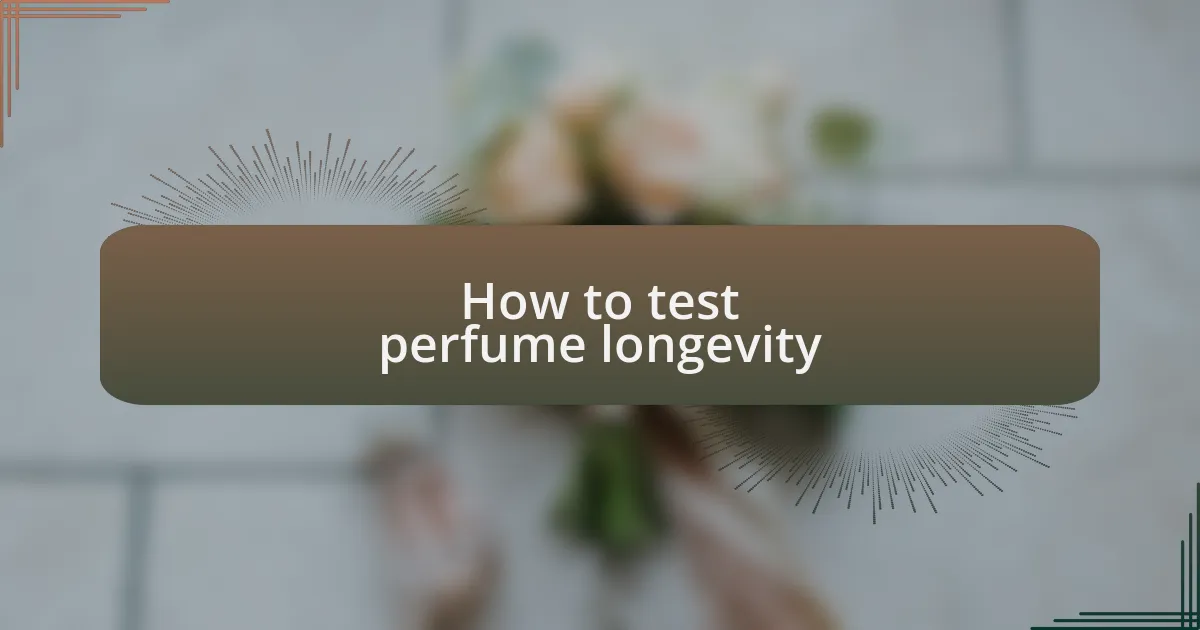
How to test perfume longevity
To test perfume longevity, I typically spray it on my wrist or the back of my hand and make a note of the time. It’s surprising to me how often I get caught up in my day and forget about the fragrance until hours later, leaving me to evaluate its staying power. Have you ever been pleasantly surprised by how a scent evolved on your skin throughout the day?
I’ve learned that reapplying fragrance can sometimes skew my perception of longevity. When I’m curious about a perfume’s true staying power, I’ll try to avoid respraying for at least six to eight hours. This method helps me appreciate the fragrance’s development over time and allows me to see how well it lingers without interference. How often do we take the time to fully experience a scent?
Another technique I like is comparing different perfumes on opposite wrists. For example, at a recent fragrance event, I enjoyed the challenge of deciding between two favorites. As the hours passed, one scent wrapped me in a cozy hug while the other faded faster, clearly marking its territory. This approach not only highlights longevity but also helps me understand how each fragrance interacts uniquely with my body. Isn’t it amazing how personal scent journeys can be?
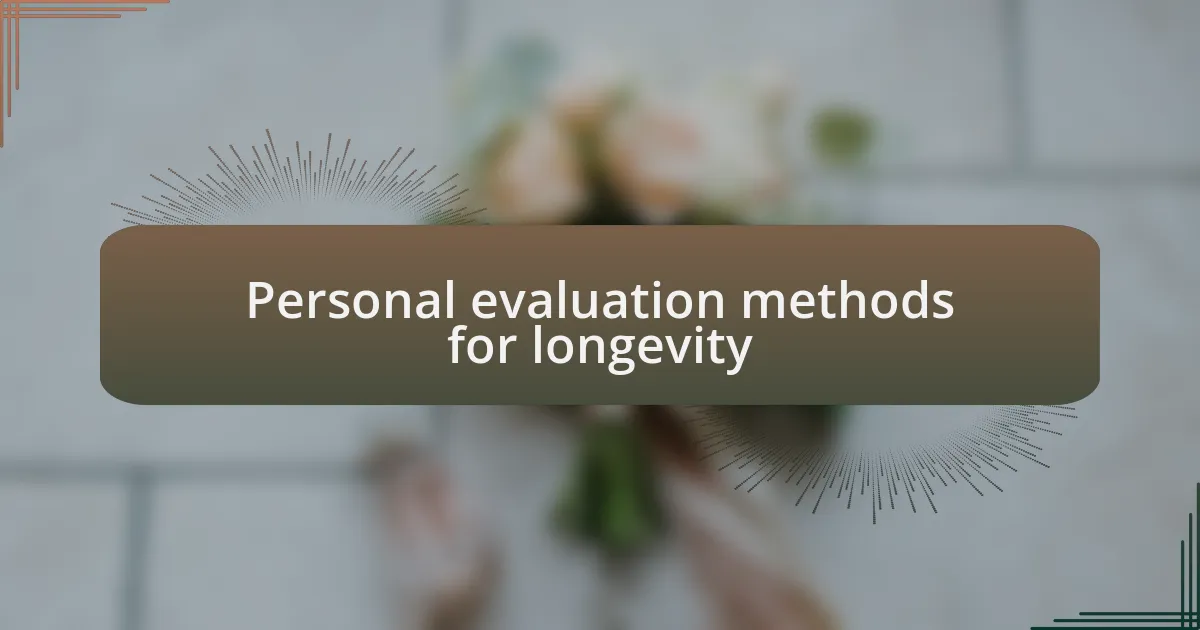
Personal evaluation methods for longevity
I often find that layers of scent reveal themselves over time, which is why I like to take notes during my day. Sometimes, I’ll jot down my thoughts in the notes app on my phone, capturing the emotion I feel as different notes come to life. It’s fascinating to reflect back on these notes days later, wondering why a particular fragrance created such a vivid memory for me. Have you ever had a scent remind you of a specific moment?
When I test longevity, I pay attention to not just how long a perfume lasts, but how it transforms throughout the day. I remember wearing a rich, floral scent to a family gathering and being surprised by how it morphed into something warmer and more comforting after a few hours. It’s almost like taking a snapshot of my emotional state at different times, and I can’t help but wonder how others perceive these changes.
In quieter moments, like when I’m working from home, I like to sit with a fragrance on for an entire day. There’s something rewarding about allowing a scent to become part of my environment. I also find it intriguing to see how a fragrance performs throughout mundane tasks like cooking or cleaning. Do certain ingredients or actions affect how I perceive its longevity? This nuanced evaluation always leaves me with fresh insights into the complex relationship I have with my perfumes.
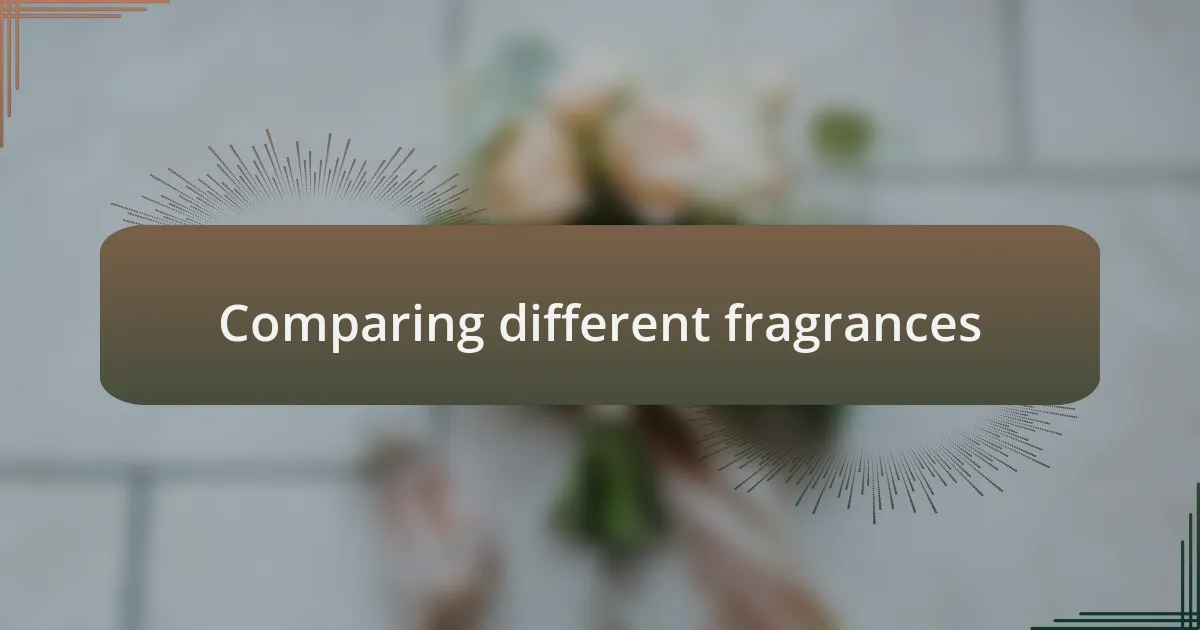
Comparing different fragrances
When comparing different fragrances, I find it essential to consider their unique characteristics. For instance, I once layered a fresh citrus scent over a warm vanilla base and discovered how dramatically the presence of each note affected my overall impression. The citrus initially sparked energy, but as it settled, the vanilla added a comforting depth that lingered throughout the day. Have you ever blended scents only to be surprised by their interaction?
I also remember attending an outdoor event wearing a woody fragrance. It was interesting to observe how the scent evolved in the fresh air compared to when I wore it indoors. The connection between the environment and the fragrance made me reflect—does the atmosphere significantly impact how we perceive longevity? It certainly seemed that way for me.
Additionally, I’ve tried comparing two similar fragrances, one being a floral and the other a fruity scent. Although they both had notes of jasmine, the experience was starkly different; the floral felt delicate yet powerful, while the fruity rendition seemed light-hearted and playful. This comparison revealed to me how a single note can be interpreted in various ways, making each fragrance a unique experience. What nuances do you notice when you switch between fragrances?
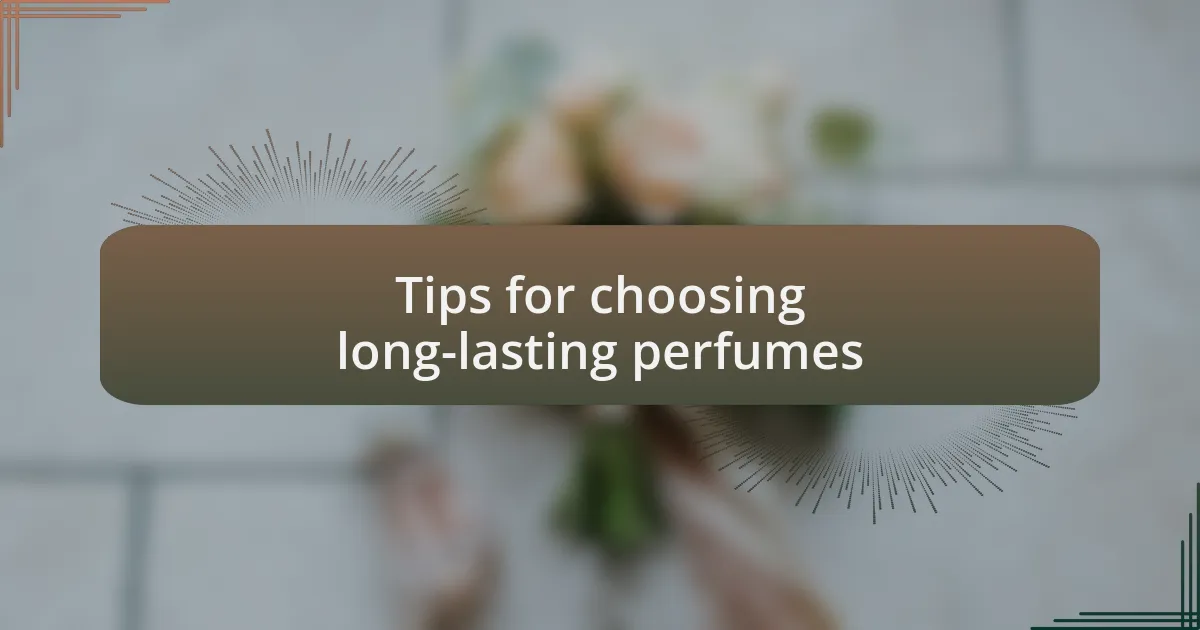
Tips for choosing long-lasting perfumes
When selecting a long-lasting perfume, consider the concentration of fragrance oils. I remember trying an Eau de Parfum for the first time, and the difference from an Eau de Toilette was remarkable. The scent seemed to cling to my skin, evolving beautifully throughout the day. Have you ever noticed how some scents fade quickly while others persist? It often comes down to that concentration.
Another tip is to pay attention to the base notes, as these are the scents that linger the longest. I once wore a scent heavy on sandalwood and amber, and to my delight, it lasted well into the evening. The warmth of those notes wrapped around me like a soft blanket. Which base note do you find most comforting? You might be surprised by how a favorite note can influence lasting power.
Lastly, don’t forget to test fragrances on your skin, not just on paper. There’s something magical about the way a scent mingles with your body chemistry. I vividly recall trying a fruity perfume that smelled delightful initially, but on my skin, it transformed into something entirely different—less vibrant and far less appealing. Have you experienced this transformation? It’s a crucial reminder that the same fragrance can wear differently on everyone, making personal testing essential to find your perfect long-lasting scent.